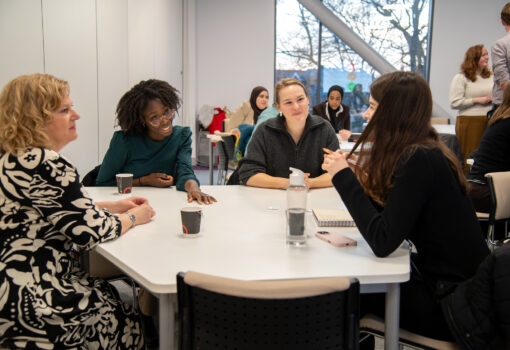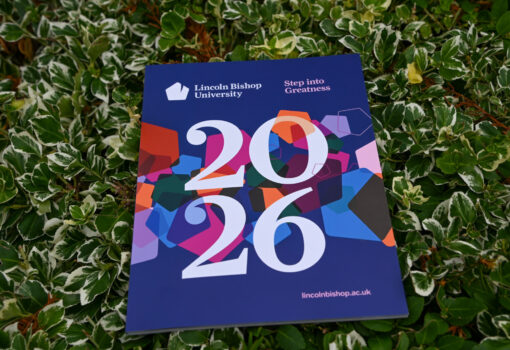Search results
-
City of Lincoln's Festival of History
BGU's Professor Andrew Jackson designs content for literary trail! -
City of Lincoln's Festival of History
BGU's Professor Andrew Jackson designs content for literary trail! -
New history of Lincoln
A detailed history of an area of Lincoln has just been published with contributions from 4 members of BGU staff. This is volume 10 of the Survey of Lincoln series: ‘Birchwood, Hartsholme and Swanpool: Lincoln’s Outer South-Western Suburbs’. This includes chapters by Dr Claire Hubbard-Hall (Skellingthorpe Aerodrome and hutments); Dr Hazel Kent (Hartsholme Country Park); Dr Andrew Jackson (The Hartsholme Housing Estate); Dr Michael Jones (Archaeology), BGU Visiting Reader; and also Heritage Studies graduate, Lesley Clarke (Swanpool Garden Suburb). The volume is available from local bookshops at £6.95, and there is a public event relating to the launch of the volume at the Lincolnshire Archives, Saturday 13 December, 11:00am-1:00pm. -
Reflections on Black History Month at BGU
Throughout October, Bishop Grosseteste University hosted a month-long programme of free events to celebrate Black History Month. The events included academic lectures, story-telling session and exhibitions that highlight the contribution of Black poets, educators, activists, athletes amongst others during this global month of celebration. Each of these sessions were designed to be educational, but also to engage and entertain in different ways while challenging received ideas and knowledge and were available to staff, students, guests and the wider public via live-stream where applicable. Dr Sheine Peart, Reader in Access, Equality and Inclusion and Project Lead for Black History Month at BGU, said: “As we reach the end of October I would like to offer some personal reflections on Black History Month at Bishop Grosseteste University 2021 which has been a resounding success in countless different ways. “The month-long programme of events was planned by a multidisciplinary University wide team and from the outset the ambition was (borrowing words from the BBC charter) to entertain, educate and inform while at the same time celebrating the multiple ways the global community has been enriched by contributions of people’s from the African diaspora. Benefiting from the skills and knowledge of University colleagues and invited contributors, each event fed into this ambition and provided new insights to the participating audiences while simultaneously honouring the common bonds which unite us and engaging with the challenges which confront us. “Through poetry, music, song, film, thought-provoking talks and story-telling sessions the audience learned of the ways Black peoples had enriched local, national and international communities including the innovative education strategies of Beryl Gilroy (the first Black Headteacher in London) and the ways the Reverend Sonia Baron in her work with the national government is currently challenging inequalities in work based and other spaces to provide better opportunities for everyone. “BHM at BGU will return in 2022 with another programme of events which will be open to students, staff and the wider public. We look forward to welcoming you to our next celebration and invite you to keep watching for future announcements.” -
BGU History NEA Award 2022
The first History prize for best 'Non-Exam Assessment' (NEA) was awarded last month. -
BGU History in the Media
November has been a busy month for the past and present staff and students of our History and Humanities courses. Five members of staff and two former BGU students have contributed to the latest volume of the Survey of Lincoln series: North of the River Witham. The BGU staff involved and their contributions comprised of: Dr Mick Jones - the archaeology of the area Dr Chris Bonfield - Lincoln’s early schools Dr Hazel Kent - cinemas Dr Claire Hubbard-Hall - The Drill Hall Dr Andrew Jackson - the Cooperative Society. Lesley Clarke, a former BGU student, provided chapters on Greyfriars and the Central Library while Helen Durham along with Professor Heather Hughes of Lincoln University, presented a chapter on the visitor economy in central Lincoln. The support of BGU to this volume is recognised in a feature within the Lincolnshire Echo, (25 November). Earlier in the month, our Head of School of Humanities Dr Andrew Jackson made an appearance at the BBC Radio Lincolnshire Armistice Day Live Broadcast on 11 November. He spoke about his work on the WWI home-front poet, Bernard Samuel Gilbert and was joined by Maureen Sutton, local poet and folklorist, who read out a few of Gilbert’s wartime poetry in dialect. For more information about our History courses, please click here. -
Pubs in Lincoln: A History
Members of the History team at Bishop Grosseteste University (BGU) in Lincoln have been out and about studying pubs over the last few months. Their research will feature in the first volume of the new theme-related series from the Survey of Lincoln project – ‘Pubs in Lincoln: A History’. Dr Claire Hubbard-Hall and Dr Hazel Kent have written about ‘Pubs in Wartime Lincoln’, while Dr Andrew Jackson discusses the city’s ‘Council Estate Pubs’. “The book traces the long history of the public house in Lincoln, and also charts what has been the rapid and striking disappearance of so many local pubs over the last couple of decades”, said Andrew Jackson, Head of School of Humanities at BGU. Pubs in Lincoln will be available from bookshops from 18 November 2017. Find out more about History at BGU. -
BGU celebrates Black History Month
October is Black History Month in the UK – a month that highlights the history, achievements, and contributions of Black people in the UK across various areas. -
BGU history lecturer reveals hidden stories about women in the publishing trade
Dr Rose Roberto, Lecturer for History at Bishop Grosseteste University and Teaching Resources Librarian has co-edited a two-volume collection of research on women's history named Women in Print. The research covers the diversity of roles women played as authors, designers, producers, distributors and readers of books from the 1400s onward. To a greater extent, the history of the printing and publishing trades in the West which has been dominated by narratives of men, despite women always having been involved. From cloistered nuns who served as scribes and illuminators for codexes we now call textbooks that were distributed in medieval university cities, to eighteenth century widows and daughters who created art and managed family engraving or printing firms, to women employed as translators, illustrators, authors and photographers during the industrial age, these two volumes, which compile the historical research of an international group of scholars setting the record straight. Women in Print, are part of the ‘Printing History and Culture’ series published by Peter Lang. Women in Print 1: Design and Identities contains eleven chapters incorporating case studies of design aspects of a printed work, or more broadly about design issues related to the business of publishing. Edited with Artemis Alexiou (York St John University) both editors have selected chapters which focus on specific individuals and their career as female artists, compositors, editors, engravers, photographers, printers, publishers, scribes, stationers, typesetters, widows-in-business, and writers. Each chapter also offers an examination of women as active participants and contributors in the many and varied aspects of design and print culture, including the production of illustrations, typefaces, periodical layouts, photographic prints and bound works. This volume explores the visual material that they produced. The second related volume, Women in Print 2: Production, Distribution and Consumption contains selections covering professional relationships between two or more women or a business network in which aspects of their roles in production, distribution and consumption of the printing trade are explored and further analysed. It was co-edited by Caroline Archer-Parré of Birmingham City University and Christine Moog of the Parsons School of Design in New York. Series editor John Hinks is also credited because of his work organising the conference and guiding the manuscripts through delays, mainly caused by two years of a world-wide pandemic, to publication. Chapter 6, 'Working Women: Female Contributors to Chambers’s Encyclopaedia’, authored by Rose Roberto reflects her discovery of women writers and the exploration of archives spanning Philadelphia to Edinburgh, and London to Manchester. So far she has uncovered 25 female encyclopaedia contributors. Besides reflecting on the lives of these women and how they came to participate a transatlantic encyclopaedia project spanning more than three decades, this chapter also traces the evolving process whereby women achieved status as professionals throughout the 1800s as various fields in different trades developed. Some names in this chapter such as Florence Nightingale (1820-1910) and Millicent Garrett Fawcett (1847-1929) are familiar. Others are less-known, but just as interesting. According to the editors of the Romantic Illustration Network (RIN), 'While most histories until the last forty to fifty years often treat women’s histories "as outstanding anomalies" in cultural and professional fields dominated by men, the aim of the scholarship in this collection . . . show that women were always present. It approaches the lives of women – and writing about their lives – as part of a process which reveals complex individual histories.' Both volumes are available for BGU staff and students at the BGU Library. Or you can purchase your own copies at the Peter Lang website. Dr Rose Roberto with the new publications -
Artefacts, Not History: the debate about Colston's statue and Britain's imperial past
Dr W. Jack Rhoden, Programme Leader for History at BGU, discusses the role of statues in the study of history
Explore Lincoln Bishop
Browse our wide range of degree courses and find the perfect one for you.
Open days are the best way to find out what Lincoln Bishop has to offer.
Download your copy of our prospectus to find out more about life at Lincoln Bishop.


